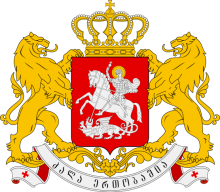Resource information
This Law regulates the following issues: (a) conservation, rehabilitation of soil and improvement of soil fertility, prevention of soil erosion due flooding, landslide, soil pollution, siltation, waterlogging, and anthropogenic impact; (b) rehabilitation, improvement of soil and rational land tenure of low productive land; and (c) establishment of maximum allowable limits of contents of hazardous substances in soil, provisions related to application of pesticides and agrochemicals. This Law shall be applicable to: (a) chemical land reclamation; (b) arrangements against natural calamities and disasters; (c) soil fertility monitoring; (d) conservation of soil; and (e) complex management of land and soil potential.
Implemented by: Order No 2-277 of 2005 of Minister of Agriculture of Georgia on Recommendation for Complex Measures for Protection of Soil from Erosion (2005-11-25)
Implemented by: Order No 36 of 2005 of Minister of Environmental Protection and Natural Resources of Georgia on Conservation of Agricultural Land and Land of Other Purpose that have been Contaminated by Industrial Toxic Waste and Radioactive Substances (2005-03-18)



